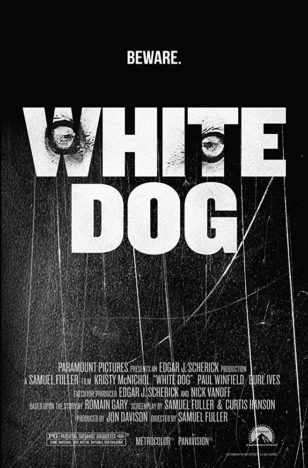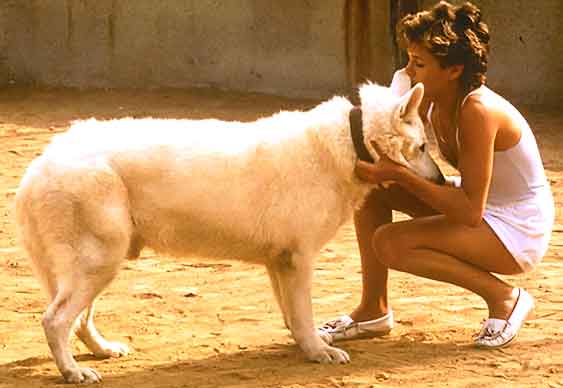 This unreleased film, WHITE DOG, is one of the late Samuel Fuller’s all-time best, a lively, entertaining and, ultimately, extremely powerful look at racism in America as seen through the attempted rehabilitation of a “White Dog”, which is to say a canine trained by racists to attack black people. Largely reviled if not ignored outright during Fuller’s lifetime, I’m hoping that sometime in the not too distant future this shamefully underrated film will finally get the recognition it deserves.
This unreleased film, WHITE DOG, is one of the late Samuel Fuller’s all-time best, a lively, entertaining and, ultimately, extremely powerful look at racism in America as seen through the attempted rehabilitation of a “White Dog”, which is to say a canine trained by racists to attack black people. Largely reviled if not ignored outright during Fuller’s lifetime, I’m hoping that sometime in the not too distant future this shamefully underrated film will finally get the recognition it deserves.
Romain Gary’s 1970 book WHITE DOG was an impassioned account of a stray dog taken in by Gary, a (then) famous French novelist living in Hollywood, and his horror at learning that the dog’s former owners had trained it to attack black people. Gary took the animal to the compound of a friend who specialized in training animals for movies, where a black employee named Keys took a special interest in reconditioning the dog. Around the same time Gary was approached by the dog’s former owner, who turned out to be a sweet old man toting two grandchildren, and from there the narrative morphs into a kaleidoscopic rumination on race relations in late sixties America. If nothing else, Gary’s book was very much a product of its time.
It was ten years later when the veteran filmmaker Samuel Fuller, working with co-screenwriter (and future L.A. CONFIDENTIAL and 8 MILE director) Curtis Hansen, adapted WHITE DOG into a modestly budgeted movie for Paramount. Fuller and Hansen wisely jettisoned much of the book’s content to concentrate on the underlying story of the white dog and its black trainer. Unfortunately, Paramount shelved the film, allegedly due to concerns about “racist” content. This was despite that fact that it starred the white-hot Kristy McNichol, who received above-the-title billing and appeared to be on the verge of superstardom, and was said to be Paramount’s then CEO Michael Eisner’s “pet project”. To date, the film’s only legitimate US release was a brief arthouse run back in 1992, after which it was buried once again.
The film’s nonrelease has had wide-ranging repercussions for at least three of the above-mentioned participants: Samuel Fuller went into self-imposed exile in France, where he remained until his death in 1997, while Kristy McNichol’s once promising film career went into permanent eclipse and the specter of WHITE DOG is still brought up by those looking to question Michael Eisner’s motives (as in “he championed WHITE DOG so why should we listen to him?”), when in fact the film remains one of the finest made under his watch.
A white German Shepard is accidentally run down one night by Julie, a young actress; she takes the dog into her Hollywood Hills home, where it saves her from an attacker. But the dog gets loose one day and, unbeknownst to Julie, kills a black man. It later attacks a black colleague on the set of a movie she’s shooting. Julie takes it to a Hollywood kennel where it’s revealed her newfound white dog is in fact a White Dog, trained by white racists to kill black people. The establishment’s co-owner Keys, a dignified and determined black man, makes it his personal quest to rehabilitate the animal, a mission that quickly takes on an unhealthily obsessive air. Indeed, Keys comes to view the WD as symptomatic of racism in America.
The White Dog escapes from the kennel one night; Keys manages to track it down the next day, but not until after it kills a black man in a church. Keys remains hell-bent on deprogramming the WD, and apparently accomplishes his goal. Julie rushes to the kennel after she hears the good news, but is confronted outside her house by an old man and his grandchildren. The man proudly proclaims himself the former owner and trainer of the WD. Julie brutally reprimands him and drives off for the final “test” of the dog’s rehabilitation.
Admittedly, this film may seem a bit bewildering to viewers unfamiliar with the work of the inimitable Samuel Fuller. Unfettered melodrama was always a Fuller hallmark, as was wildly baroque camerawork and loony dialogue like “That dog’s a four-legged time bomb!” (directly recalling Fuller’s early days as a 1940’s-era tabloid reporter). Fuller was also known for his hard hitting explorations of racism, of which WHITE DOG was definitely the apotheosis.
By any standard the film’s narrative is a fully absorbing and entertaining one. It’s also an unusually assured piece of filmmaking that works as a horrific thriller, a touching drama (a bit like a twisted retelling of BENJI) and an uncompromising treatise on racism and its consequences. The four dogs chosen to play the title canine deliver what must be counted as among the finest animal performances in movie history (the end credits assure us that the American Humane Association was on hand to monitor their treatment on the set). As for the human performers, the childlike Kristy McNichol proves quite engaging in the lead role, while Paul Winfield is pitch-perfect as the obsessed Keys; the two actors make for a nice contrast in a film that manages to enchant and disturb in equal measure, with an unforgettable, heart-wrenching final shot.
Vital Statistics
WHITE DOG
Paramount Pictures
Director: Samuel Fuller
Producer: Jon Davison
Screenplay: Samuel Fuller, Curtis Hansen
(Based on a book by Romain Gary)
Cinematography: Bruce Surtees
Editing: Bernard Gribble
Cast: Kristy McNichol, Paul Winfield, Hubert Wells, Jameson Parker, Christa Lang, Samuel Fuller, Paul Bartel, Dick Miller, Martine Dawson, Vernon Weddle, Tony Brubaker, Marshall Thompson, Alex A. Brown, Cliff Pellow, Parley Baer

